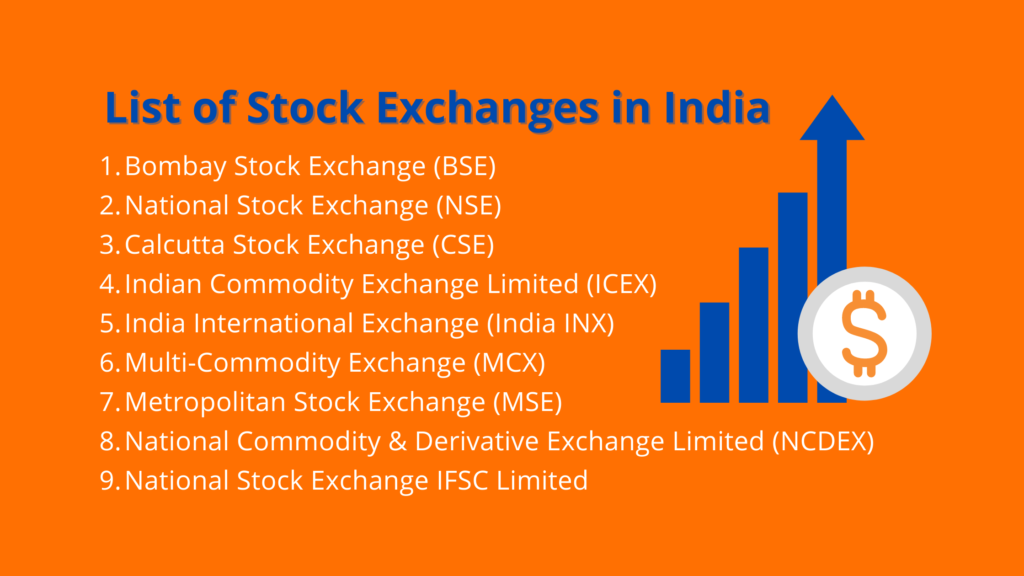The stock exchange has come to be a part of any country’s financial market with the role it contributes to the money market cutting across the economic, social, and political sectors of a country. When a stock exchange is mentioned in India, two stock exchanges come to the mind of the average Indian or someone outside India namely- National Stock Exchange (NSE) and the Bombay Stock Exchange (BSE).
However, the Indian stock market has been existing for a long time and as such there are more stock exchanges in India that have existed and are not functional now, while others are still existing but are not pronounced like the other aforementioned. For this article, I will be exposing the various stock exchanges we have in India but first, let’s understand what the stock market and stock exchange are all about.
What is Stock Market & Stock Exchange?
To understand what a stock market or stock exchange is all about, it is ideal to know what a stock is. A stock is a share or equity that serves as a financial instrument that stands in for someone making him a part of a company or corporation’s ownership. It is that which marks the presence of an individual within an organization.
You probably have an idea of what a market is all about. Where people come to buy and sell their goods and services. The stock market refers to where investors come together to buy and sell investments- usually stocks of public companies.
The stock exchange does not involve the owing of shares rather it is a centralized location for corporations and governments that allows investors to buy and sell equities. In other words, it is a marketplace where securities are bought and sold such as bonds and stocks. Companies or the government can raise capitals which will allow the investors to make decisions on it based on current market price information. The stock exchange can either take place physically or electronically on a trading platform.
Having established the common variables regarding the stock exchange, we can now delve into the various stock exchanges we have in India.
Types of Stock Exchange in India
India’s stock exchange is divided into two viz:
- National Stock Exchange (NSE)
- Regional Stock Exchange (RSE)
The various sub-stock exchanges in India are found in either of the two categories.
How Many Stock Exchanges in India?
India’s stock exchange has been there for ages and a lot of stock exchanges have risen and faded away. Based on the types of stock exchanges in India, there are 8 active National Stock Exchanges, and about 21 Regional stock exchanges. With this in mind, let’s have an exposition on the various stock exchanges with emphasis on the active stock exchanges.
List of Stock Exchange
1. Bombay Stock Exchange (BSE)
Bombay Stock Exchange (BSE) located at Dalal Street, Mumbai, Bombay stock exchange is the first stock exchange in India that traces its foundation to 1875. Not just that it is India’s oldest stock exchange, but the whole entirety of Asia’s stock exchange, the Bombay stock exchange is still the oldest. It is also India’s largest stock exchange and the world’s no 10 stock exchange with a market cap of $2.8 trillion in February 2021. Bombay stock exchange in February 2017 became the first listed stock in India and also it is currently regarded as the fastest stock exchange in the world with a record speed of 6 microseconds (6µs).
2. National Stock Exchange (NSE)
National Stock Exchange (NSE) also based in Mumbai, the national stock exchange was established in 1992 and gained recognition in 1993 by the Securities and Exchange Board of India (SEBI) before launching fully in 1994. NSE is known to be the first stock exchange that had an electronic trading system that provided for its investors. The arrival of NSE eliminated the monopoly effect by the BSE.
3. Calcutta Stock Exchange (CSE)
Calcutta has a long history to its name having started under the Neem Tree in the 1830s. CSE got incorporated as a stock exchange in 1908 with its operation coming out from Kolkata. Currently, SEBI has requested the removal of Calcutta with the matter currently in the court.
4. Indian Commodity Exchange Limited (ICEX)
Indian Commodity Exchange Limited (ICEX) is a commodity derivative exchange regulated by SEBI, although most people believe it is not a stock exchange. With its headquarters in Mumbai, this is the first exchange that launched the ever first diamond derivative contracts and this is a permanent exchange. ICEX was established in 2009 but was shut down in 2014 and afterward allowed to operate again by 2017. Not just the diamond derivative contracts, ICEX also allows for Agri derivatives.
5. India International Exchange (India INX)
India International Exchange (India INX) was founded in 2017 with its headquarters at International Financial Services Center (IFSC) in Gujarat. This new exchange is India’s first international stock exchange and is a subsidiary of BSE. India INX trades only in derivative products.
6. Multi-Commodity Exchange (MCX)
Multi-Commodity Exchange (MCX) as the name implies, this is one of the largest commodity exchanges in India. It deals with the exchange of trading in a commodity such as industrial metals, energy, Agri, and non-Agri products. Being located in Mumbai, it traces its establishment in 2003 and went ahead to become the first listed commodity exchange ahead of BSE and NSE.
7. Metropolitan Stock Exchange (MSE)
Metropolitan Stock Exchange (MSE) is another Mumbai-based company that was established in 2008 and kicked off trading in 2009. MSE has an option of trading in options, currency, and equity derivatives.
8. National Commodity & Derivative Exchange Limited (NCDEX)
National Commodity & Derivative Exchange Limited (NCDEX) situated in Mumbai and founded in the same period as MCX in 2003, NCDEX has maintained its presence in agriculture commodity derivatives which includes cereals, oils, pulse, mustard seeds, etc.
9. National Stock Exchange IFSC Limited
National Stock Exchange IFSC Limited has the same product offering and shares the same location with India INX via operating from the International Financial Services Center in Gujarat. It is a subsidiary of the National Stock Exchange (NSE) established in 2016 with an interest in trading derivative segments.
These are the list of stock exchanges that are believed to be still active under the regulations of SEBI however other stock exchanges have been shut down.
Conclusion
A stock exchange is a marketplace where people (investors) come together to buy and sell commodities. Unlike the two pronounced stock exchanges that most people know about in India, according to SEBI, there are 8 active stock exchanges except for the Calcutta stock exchange which is still in the court.
Frequently Asked Questions (FAQs)
What are the main stock exchanges in India?
India has two main stock exchanges namely the Bombay Stock Exchange (BSE) and National Stock Exchange (NSE).
How many recognized stock exchanges are in India?
There are about 8 recognized active stock exchanges by SEBI.
What is the name of India’s largest stock exchange?
Prior now, the Bombay Stock Exchange (BSE) was the oldest and largest stock exchange in India, however, the advent resurrection of the National Stock Exchange (NSE) in terms of volume is said to have become India’s largest stock exchange.
Which is the oldest stock exchange in India?
Established in the year 1875, the Bombay Stock Exchange remains the oldest stock exchange in India. Not just restricted to India alone, BSE is also the oldest in the whole of Asia.

Pardeep is the founder and editor of Small Investment Ideas. He believes that everyone can change their life with the help of small investments and achieve financial freedom.


